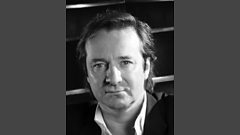
Arrivals and Departures
Includes music by Purcell, Eno and Pärt and poems by Elizabeth Bishop, William Blake, Emily Dickinson and Louis MacNeice read by Niamh Cusack and Neil Pearson.
Includes music by Purcell, Eno and Pärt and poems by Elizabeth Bishop, William Blake, Emily Dickinson and Louis MacNeice read by Niamh Cusack and Neil Pearson.
Readings:
William Blake: Infant Sorrow
Vernon Scannell: First Child
Dannie Abse: Return to Cardiff
Constantine P. Cavafy, translated by Edmund Keeley: Ithaka
Seamus Heaney (translator): Beowulf
Ted Hughes: The Thought Fox
Elizabeth Bishop: Arrival at Santos
Denis Glover: Leaving For Overseas
Emily Dickinson: There came a wind like bugle
Philip Larkin: Poetry of Departures
Louis MacNeice: The Suicide
John Donne: A Valediction: Forbidding Mourning
Walter de la Mare: Good-Bye
Producer: Torquil MacLeod
Last on
Music Played
Timings (where shown) are from the start of the programme in hours and minutes
-
![]() 00:00
00:00George Frideric Handel
Sinfonia: Arrival of the Queen of Sheba
Performer: The Academy of Ancient Music, Christopher Hogwood (Conductor).- OISEAU LYRE 4105532.
- Tr5.
-
William Blake
Infant Sorrow, read by Neil Pearson
Vernon Scannell
First Child, read by Niamh Cusack
![]() 00:04
00:04Peter Hammill
Autumn
Performer: Peter Hammill, Graham Smith (violin).- Charisma ?CASCD 1125.
- Tr2.
Dannie Abse
Return to Cardiff, read by Neil Pearson
![]() 00:11
00:11Claudio Monteverdi
Scene 7: Ulisse. Dormo ancora
Performer: Fernando Guimaraes, Boston Baroque, Martin Pearlman (Music Director).- LINN CKD451.
- CD1 Tr7.
Constantine P. Cavafy, translated by Edmund Keeley
Ithaka, read by Niamh Cusack
![]() 00:18
00:18Nikos Skalkottas
Overture for Orchestra The Return of Ulysses
Performer: �鶹Լ�� Symphony Orchestra, Nikos Christodoulou (Conductor).- BIS BISCD 13331334.
- CD2 Tr13.
Seamus Heaney (translator)
Beowulf, read by Neil Pearson
Ted Hughes
The Thought Fox, read by Ted Hughes (�鶹Լ�� Archive recording 'Poetry Society's Diamond Jubilee Recital' broadcast on 10 February 1969)
![]() 00:27
00:27Brian Eno
1/2
Performer: Brian Eno.- VIRGIN ENOCD 6.
- Tr3.
Elizabeth Bishop
Arrival at Santos, read by Niamh Cusack
![]() 00:35
00:35Già il sole?
- SONY SM2K91135.
- CD2 Tr15.
![]() 00:37
00:37Chi sia?
- SONY SM2K91135.
- CD2 Tr16.
Denis Glover
Leaving For Overseas, read by Neil Pearson
![]() 00:41
00:41Neil Young
Cortez The Killer
Performer: Neil Young & Crazy Horse.- REPRISE 7599272262.
- Tr8.
Emily Dickinson
There came a wind like bugle, read by Niamh Cusack
![]() 00:43
00:43Henry Purcell
The Witches' Dance
Performer: Anne Sofie von Otter, Stephen Varcoe, The English Concert, Trevor Pinnock (Conductor).- ARCHIV 4276242.
- Tr19.
Philip Larkin
Poetry of Departures, read by Neil Pearson
![]() 00:48
00:48Gustav Holst
Neptune, The Mystic
Performer: English Chamber Orchestra, Simon Rattle (Conductor).- HMV HMV5721392.
- Tr7.
Louis MacNeice
The Suicide, read by Niamh Cusack
![]() 00:56
00:56George Gershwin/Heyward
My Mans Gone Now
Performer: Miles Davis, Gil Evans.- Columbia Legacy 88697491992.
- Tr9.
John Donne
A Valediction: Forbidding Mourning, read by Neil Pearson
![]() 01:02
01:02Jacques Brel
Ne Me Quitte Pas
Performer: Jacques Brel.- El Records 5013929318533.
- Tr17.
Walter de la Mare
Good-Bye, read by Niamh Cusack
![]() 01:07
01:07Arvo Pärt
Nunc Dimittis
Performer: Estonian Philharmonic Chamber Choir, Paul Hillier (conductor).- HARMONIA MUNDI HMU 907401.
- Tr8.
Producer's Notes: Arrivals and Departures
Our lives are made up of arrivals and departures, comings and goings, entrances and exits. This programme announces its advent in grand style with Handel’s Arrival of the Queen of Sheba. Originally composed as an interlude at the beginning of Act III of the oratorio Solomon, this piece of music has acquired a life of its own, becoming a popular choice at weddings to accompany the entrance of the bride.
Probably the most significant arrival we experience is birth. William Blake’s Infant Sorrow presents this as a troubling event – the world is hostile and the child is unwanted. The parents in First Child by Vernon Scannell are also anxious about the impact that this new arrival will have on their lives, but although these fears are largely assuaged once the child is born, they are replaced by other concerns about the well-being of this vulnerable infant in a threatening world.
If they survive these dangers, eventually children grow up and leave home. In Autumn, Peter Hammill sings from the point of view of a father, left feeling bewildered and resentful following his children's departure: “To our sorrows they were quite deaf/And as soon as they could they left us to our tears”.
We may leave our childhood homes behind, but sometimes we return only to find that arriving in a place which used to be so familiar can be uniquely disorienting, an experience described here by Dannie Abse in Return to Cardiff.
One of the most celebrated homecomings in European literature is that of Odysseus, finally returning to the island of Ithaca after the decade-long Trojan War and a further ten years of storm-tossed peregrinations around the Mediterranean. In Monteverdi’s Il ritorno d’Ulisse in Patria, the hero sees Ithaca again for the first time in twenty years as he awakes, confused, on the shore. C. P. Cavafy encourages the reader to set sail for Ithaca, but cautions us that what we experience on the journey is more important than the eventual arrival at our destination. This Odyssean triptych concludes with Nikos Skalkottas’s overture The Return of Ulysses.
Arrivals can be a cause for joy and celebration, but they can also be a source of dread, in this case the arrival of Grendel at Hrothgar in Seamus Heaney’s translation of Beowulf. However, on this occasion the fiend’s orgy of bloodlust is not going to play out as he anticipates. But it’s not just monsters that can make a dramatic entrance during the hours of darkness. In The Thought Fox, Ted Hughes conjures up an incarnation of something more abstract travelling inexorably towards him through the night – inspiration.
Some places, such as airports and train stations, are defined by arrival and departure. They only exist as an introductory or valedictory envelope for a more substantial place – the city or country that we’re visiting or leaving. With his first ambient release – Music For Airports – Brian Eno sought to create music that was “as ignorable as it is interesting”, much like the architecture of airports themselves.
While seaports are more substantial – settlements in their own right - they also have an atmosphere of transience and churn. Elizabeth Bishop’s Arrival At Santos captures the impatient curiosity of the tourist enduring the inevitable rigmarole of landing at a port and being processed through immigration before travelling on to their desired destination.
But what of those looking out to sea, waiting for that longed-for ship to appear on the horizon? In Puccini’s Madame Butterfly, the ship that finally brings Pinkerton back to Japan also carries a bitter cargo of heartache for Cio-Cio-san. Pinkerton doesn’t have the courage to break the news to Butterfly that he has married someone else and has only come back to collect his son – he tells her maid, Suzuki, not to wake her – leaving his wife Kate and the US consul Sharpless to deliver the blow.
Pinkerton is a lieutenant in the US Navy and the New Zealand poet Denis Glover was also a naval officer. A life spent serving at sea is marked by repeatedly leaving one place and heading for another and is rarely attended by more peril and uncertainty than during wartime, as we see in Glover’s poem Leaving for Overseas.
A hostile force ‘dancing across the ocean’ and making deadly landfall on a foreign shore is the subject of Neil Young’s Cortez The Killer, a song about the Spanish conquistador whose arrival in the Americas spelt the end of the Aztec civilisation.
In Emily Dickinson’s There came a wind like a bugle, sudden devastation hits a small town, but the source this time is natural rather than human – a powerful storm.
If one of the most notable arrivals in classical literature is Odysseus’s return to Ithaca and his subsequent routing of the suitors who had taken residence in his home, then surely one of the most famous departures is that of Aeneas from Carthage, leaving Dido in suicidal despair. This poignant moment is depicted here in Purcell’s opera Dido and Aeneas.
Aeneas is unsure as to whether he should leave Carthage to fulfill his destiny, or stay with the woman he loves, and Philip Larkin is equally ambiguous about the merits of turning one’s back on all that is familiar. In Poetry of Departures he acknowledges the bracing thrill that the idea of walking away from his current life gives him and yet, at the same time he sees such a move as “artificial/Such a deliberate step backwards”.
In contrast with these abrupt departures, Neptune – the final movement in Holst’s The Planets – is notable for the gradual nature of its ending. One of the first pieces of orchestral music to feature a fade-out, Holst stipulated that the women's choruses were "to be placed in an adjoining room, the door of which is to be left open until the last bar of the piece, when it is to be slowly and silently closed", and that the final bar (scored for choruses alone) is "to be repeated until the sound is lost in the distance".
These voices may dissolve into silence, leaving no trace, but absence is often most vividly and painfully denoted by what is left behind. Louis MacNeice’s poem The Suicide provides a meticulous portrait of an office, formerly occupied by a man who has just thrown himself out of the window.
My Man’s Gone Now from Gershwin’s Porgy and Bess is Serena’s lament after her husband is killed in a brawl. Her sorrow at this sudden and permanent departure is poignantly expressed here by one of the most eloquent voices of the 20th century – Miles Davis’s trumpet.
John Donne is insistent that there should not be a comparable outpouring of grief when he dies – the spiritual bond between him and his wife will endure despite him taking leave of his earthly existence. In the event, Donne outlived his wife by 14 years and deeply mourned her death.
Ne Me Quitte Pas sees an abject Jacques Brel begging his lover not to leave him. Brel’s live performances of this song were often gut-wrenchingly emotional, conveying the profound pain and terror of the prospect of the loved one closing the door behind them, never to return. This melancholy finality also resonates through Walter de la Mare’s poem Good-Bye.
We must go – it can’t be put off any longer. Rather than raging against our leave-taking, better to be resigned to it. In the Gospel of St Luke, the aged Simeon is content to die, having seen the infant Jesus and held him in his arms – Lord, now lettest thy servant depart in peace. So let us depart in peace with Arvo Pärt’s setting of the Nunc dimittis.
Torquil MacLeodBroadcasts
- Sun 11 Sep 2016 17:30�鶹Լ�� Radio 3
- Mon 30 Dec 2019 18:15�鶹Լ�� Radio 3
The hidden history of plant-based diets
Books website
Get closer to books with in-depth articles, quizzes and our picks from radio & TV.



